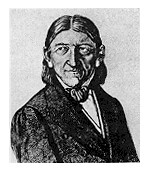The purpose of education is to encourage and guide man as a conscious, thinking and perceiving being in such a way that he becomes a pure and perfect representation of that divine inner law through his own personal choice; education must show him the ways and meanings of attaining that goal. (Friedrich Froebel 1826 Die Nenschenerziehung, pp. 2).
via infed.org | Friedrich Froebel (Fröbel).
Friedrich Froebel believed that humans are essentially productive and creative – and fulfilment comes through developing these in harmony with God and the world. As a result, Froebel sought to encourage the creation of educational environments that involved practical work and the direct use of materials. Through engaging with the world, understanding unfolds. Hence the significance of play – it is both a creative activity and through it children become aware of their place in the world. He went on to develop special materials (such as shaped wooden bricks and balls – gifts), a series of recommended activities (occupations) and movement activities, and an linking set of theories. His original concern was the teaching of young children through educational games in the family. In the later years of his life this became linked with a demand for the provision of special centres for the care and development of children outside the home.
Froebel’s abiding influence has come in part from the efforts of followers such as Bertha von Marenholtz-Bülow. We have seen the development of kindergartens, and the emergence of a Froebel movement.
